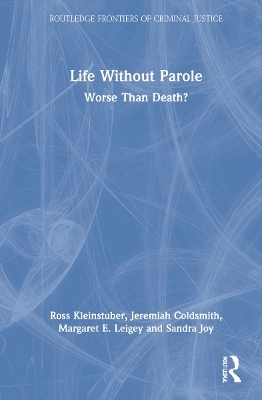
Life Without Parole
Routledge (Verlag)
978-0-367-75271-2 (ISBN)
Over the last 30 years, LWOP has exploded in the United States. While the use of capital punishment over that same time period has declined, it must be recognized that LWOP is, in fact, a hidden death sentence. It is, however, implemented in a way that allows society to largely ignore this truth. While capital punishment has rightfully been subject to intense debate and scholarship, LWOP has mostly escaped such scrutiny. In fact, LWOP has been touted by both death penalty abolitionists and by tough-on-crime conservatives, which has allowed it to flourish under the radar. Specifically, abolitionists have advanced LWOP as a palatable alternative to capital punishment, which they perceive as inhumane, error-prone, costly, and racially biased. Conservatives, meanwhile, advocate for LWOP as an effective means of fighting crime, a just form of retribution, and necessary tool for managing incorrigible offenders. This book seeks to tap into and help inform this growing debate by subjecting these key arguments to empirical scrutiny. The results of those analyses fail to produce any evidence in support of any of those various justifications and therefore suggest that LWOP should be abolished and replaced with life sentences that come with parole eligibility after a maximum of 25 years.
The book will be of great interest to students and scholars of criminology and criminal justice and will also have crossover appeal into the fields of law, political science, and sociology. It will also appeal to criminal justice professionals, lawmakers, activists, and attorneys, as well as death penalty abolitionists, opponents of mass incarceration, advocates for sentencing reform, and supporters of prisoners’ rights.
Ross Kleinstuber is an Associate Professor of Justice Administration & Criminology at the University of Pittsburgh at Johnstown. His research focuses on the intersection of law and society, capital punishment, life without parole, mass incarceration, racial inequality in the justice system, and human rights abuses. Jeremiah Coldsmith holds a PhD in sociology. His individual research focuses on the intersection of identity and stratification, and as a methodologist and statistician, he has an active research, in collaboration with Dr. Kleinstuber, that focuses on quantifying LWOP’s effects on violent crime rates. Margaret E. Leigey is a Professor and Chair of Criminology at The College of New Jersey. Her research explores the experiences of those serving life without parole, in particular aging individuals, those who were sentenced as juveniles, and women. Sandra Joy a Professor of Sociology at Rowan University, licensed clinical social worker, mental health clinician, and activist in the movement to abolish capital punishment and LWOP. Her research explores the grief and loss issues confronting the families of those on death row, life without parole, and coalition politics in the anti-death penalty movement.
Acknowledgements
List of Figures
List of Tables
Introduction: Meet the New Death Penalty: Life Without Parole
References
Part I: Examining the Abolitionist Case for LWOP
1. Is LWOP Inhumane? The View from Death Row
The Phenomenon of Death Row "Volunteers"
The Perspective of the Non-Volunteers
The Experience of Being Resentenced from Death to LWOP
Conclusion
References
2. Is LWOP Inhumane? The View from Those Serving LWOP
Execution and "Execution by Installment": Perceptions of Those Serving Informal and Formal Death Sentences
On "Being Dead While You're Still Alive": A Study of California’s Recent Propositions to Abolish the Death Penalty
The Pains of Permanent Imprisonment: Quantitative and Qualitative Findings
"An Inescapable Burden": Maturation and Change Under Permanent Punishment
"An Invisible Entity:" The Experiences of Women Perpetually Incarcerated
Conclusion: Life Without Parole "Picks You Apart"
References
3. LWOP and Human Rights: The View from Abroad
By the Numbers
LWOP and Human Rights Worldwide
Final Thoughts
References
4. Worse Than Death: Innocence and Access to the Courts
Super Due Process, Life, and Death
Super Due Process and Innocence
Methodological Appendix
References
Conclusion
5. The Price of Life: The Financial Burden of LWOP
Yes, Death Sentences Cost More Than Life Sentences
But Those Costs Save Lives
And There Are More Life Sentences
Summary
References
6. LWOP as Racial Control
The Death Penalty is Racial Control and LWOP is the Death Penalty
LWOP Targets the Disadvantaged
Juvenile LWOP
Conclusion: A War on Which Crimes?
References
Part II: Examining the "Tough-On-Crime" Case for LWOP
7. LWOP and the War on Crime
Enactment of LWOP Statutes and Violent Crime
The Effect of Using LWOP More Frequently on Violent Crime
Conclusion
Methodological Appendix
References
8. Is LWOP Just Retribution or Cruel & Unusual Punishment?
LWOP Violates the Core Principles of Retribution
Retribution Does Not Benefit Most Victims
Conclusion
References
9. The Power of Second Chances: Stories of Redemption
The Subjects
Early Days in Prison
Maturation, the Influence of their Elders, and the Road to Redemption
Finding Redemption and Giving Back
Conclusion
References
Conclusion & Recommendations
Policy Recommendations
References
Index
| Erscheinungsdatum | 19.04.2022 |
|---|---|
| Reihe/Serie | Routledge Frontiers of Criminal Justice |
| Zusatzinfo | 14 Tables, black and white; 3 Line drawings, black and white; 3 Illustrations, black and white |
| Verlagsort | London |
| Sprache | englisch |
| Maße | 156 x 234 mm |
| Gewicht | 480 g |
| Themenwelt | Recht / Steuern ► EU / Internationales Recht |
| Recht / Steuern ► Strafrecht ► Kriminologie | |
| Recht / Steuern ► Strafrecht ► Strafverfahrensrecht | |
| Sozialwissenschaften ► Soziologie | |
| ISBN-10 | 0-367-75271-9 / 0367752719 |
| ISBN-13 | 978-0-367-75271-2 / 9780367752712 |
| Zustand | Neuware |
| Informationen gemäß Produktsicherheitsverordnung (GPSR) | |
| Haben Sie eine Frage zum Produkt? |
aus dem Bereich


